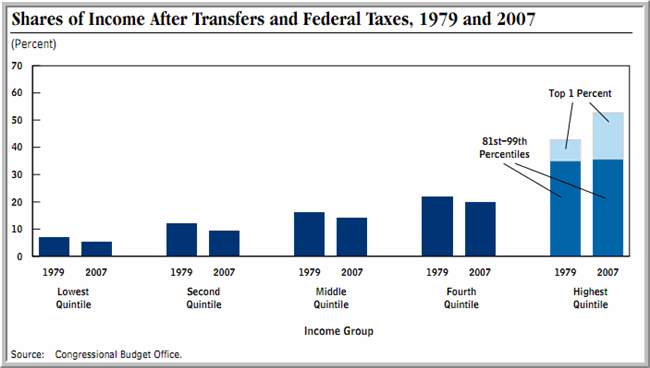The Congressional Budget Office’s recent report on National Income trends for the past 30 years finds that the top 20% of earners have gained at least twice as much in income while all other other groups have fallen behind. The Wall Street Journal felt compelled to respond with the interview below in its Opinions section.
From the beginning this WSJ video opinion piece was out of kilter. The interviewer/reporter fails to identify himself – so he shall be identified as Anonymous Reporter. Then guest and WSJ columnist Mary Anastasia O’Grady makes verbally clear that she really wants nothing to do with this tiresome “news flash issue”. So there is no effort by Mary or Anonymous Reporter to use any of the many available and succinct charts that quickly summarize the Wealth Inequality issue. And there are plenty of sources like the one from the CBO report shown below [also see here for some very relevant charts and graphics] :
Even more compelling is that this data stop in 2007 and the top 1% have been doing very well indeed in 3 of the 4 past years while economic data shows decline in incomes for the lower 99% for the same period. See here for more details.
So Mary establishes that this issue of Wealth Inequality reflects a recurring “Media fascination with political overtones”. Next Mary dismisses the idea that executive compensation [which she fails to mention is currently 320 times the average workers pay in top US companies] is at all a relevant measure. Rather Mary argues that the current poverty level at $14,700 for a family of two in the US for 2011[again, a $numbert omitted by Mary] is quite well off relative to other countries. Furthermore Mary argues that upward wage mobility is the prize that most Americans value the most[again, no reference for this assertion by Mary] – their ability to jump up one or two quintiles in the earnings parade.
Mary furthur argues that this upward wage movement is determined by a host of factors most of which are not influenced by top executives pay[Mary does not consider executive total compensation as crowding out lower level salaries and wages and corporate financing , nor the race to the bottom in wages and benefits in many corporations, nor the shedding of jobs through automation or off-shoring].Instead she posits this interest in Wealth Inequality as a precursor to policies that “Punish the Rich” . Then Anonymous Reporter interrupts to say that if George Soros can double my wealth then I don’t begrudge him tripling his own management income. This is the justification for Hedge Fund and other financial advisory fees being so much higher than other financial compensation[ in 2009 the average pay for the top 25 Hedge Fund managers was $1billion]. But Mary steers clear of this and instead argues that Bill Gates of Microsoft is a better example. Bill is a wealth creator and therefore any attempts to measure his compensation versus performance is just an attempt to create counter productive pay envy.
Thus Mary concludes that movements like Occupy Wall Street are not good because they smack of class warfare which is largely un-American[and reserved for the top 1% of Americans]. To which Anonymous Reporter adds that if you are among the 9% offically unemployed and 20% underemployed, you are not going to be concerned when you finally get a job you are not going to be concerned about how much your new company’s CEO is making [again no mention of the fact that for Fortune 500 companies it is likely 320 times or more than you will be making]. In response Mary argues that innovation and risk taking requires skewed compensation for these “job creators”. The last thing the US wants now is ideas that smack of the French Revolution. Mary argues that it is completely backwards to consider that top level compensation and taxation can be tapped to help control our economic woes. Finally, Mary concludes that ” when I get there, there better not be a lot of people coming after me”. “Get there” is later revealed to be a $billion or more in wealth.
Summary
So there you have it – an utterly dismissive and nearly factless examination of the Occupy Wall Street movement. The conclusion is yet again an encomium to Trickle Down for the almost exclusive benefit of the topmost Job and Wealth creators – and don’t you dare consider examining their performance versus their compensation. And as for taxes as percentage of income – just forget that altogether. If you look at the Opinion section of the Wall Street Journal , these type opinions have become standard fare, in effect partisan political diatribes. The result is quite FoxNews-like: WSJ Opinions have become ultra conservative viewpoints and almost factless arumentation[remember this is an Opinion, so journalistic standards for fact checking and issue overview can simply be ignored]. Instead of the old Dow Jones comprehensive analysis and unbiased insight which one would count on for well considered, non-partisan opinion and critical thinking at a time of National Testing, one now gets the new WSJ Opinion – it has become just another conservative mouthpiece for Rupert Murdoch and friends. Such a waste of hard earned Journal credibility.


